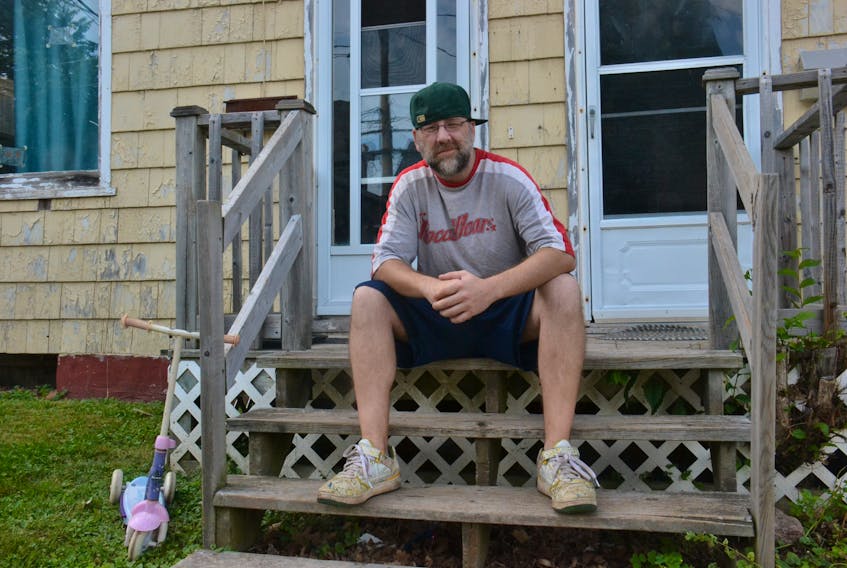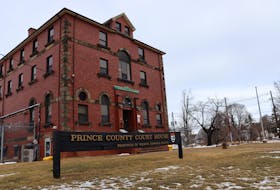CHARLOTTETOWN, P.E.I. — Jeff Gallant is not sure where he’ll be sleeping tomorrow.
The father of two was issued an eviction notice from his Fitzroy Street apartment two months ago, soon after the building was sold. He says he’s tried everything he can to find a two-bedroom or three-bedroom apartment in Charlottetown. He will be evicted on Saturday.
“I'm on Kijiji every day now, refreshing every hour," he said on Wednesday as he took a break from packing his belongings into boxes.
"You look at an ad posted an hour ago and 800 people have viewed this page."
He hasn’t had a lot of luck. Apartments posted on the online advertising site are often snapped up within half an hour.
Gallant, who works at a local T-shirt printing business, says this is the second time he has been ‘renovicted’ this year. The mother of his kids – the two are separated — has also been evicted twice this year but has managed to find a coveted three-bedroom apartment.
As for Gallant, he’s mostly living day to day.
“I don't have any place to put my stuff so I'm going to have to find storage somewhere. And then, couches, I guess,” he says.
“Hopefully I have some good friends."
P.E.I.’s rental crisis and the province’s response
- 653 tenants receiving rent subsidies (June 2019)
- 1,748 applications for housing support since July 2018
- 1,050 people currently on the housing registry (585 family, 465 seniors)
- $3.4 million increase (+108%) in spending on rent supplements since 2018.
- 254 units of affordable housing either under construction or in planning stage
- 19 out of 27 actions promised for summer 2019 actually carried out (70 per cent)
Gallant acknowledges his is an old story by this point. He has fielded calls from several journalists in the past month. When contacted for this story through Facebook, he asked “how many stories do we need before something changes?”
The story was supposed to have changed by now. The rental crisis in P.E.I. has been a simmering frustration for Island tenants for two years. Vacancy rates are at an all-time low, at 0.2 per cent in Charlottetown and 0.9 per cent in Summerside.
Last July, the Liberal government launched a comprehensive housing action plan which it said would meet the housing needs of all Islanders. Former Charlottetown mayor Clifford Lee was brought in to co-ordinate its implementation. As the senior adviser for housing and infrastructure, he continues to draw a salary between $96,316 and $120,394. Lee was not made available for an interview by provincial staff.
The plan set out a variety of goals, most notably the disbursement of hundreds of new rent supplements and the expedited construction of new housing units. By 2022, the plan pledged to create 1,000 new affordable housing units, defined as having rents of less than 30 per cent of tenants’ before-tax income.
One year later, the Progressive Conservative government has inherited the crisis, and has tasked Ernie Hudson with fixing it.
Hudson, the minister of Social Development and Housing, says the provincial government has made progress on addressing the most urgent housing needs of Islanders. As of last month, 653 Islanders were receiving rent supplements.
Hudson acknowledged the rent supplements are not a long-term solution. But they will help address the needs of the 1,050 individuals on the province’s housing registry. The problem remains a lack of rental supply.
“On the short term it is that solution,” Hudson said.
“It's a construction issue. There are various players, if you like, that are involved whether it's builders, whether it's government, whether it's the communities themselves.”
“We have people that are in need. We need to stop and get units started in terms of new builds because it can take, even if everything goes perfectly well, 18 months. We focused on the rent supplements in terms of getting some affordability for people who were currently in the rental market."
-Sonya Cobb
Since July 2018, construction projects have also been announced for 254 government-funded affordable units across P.E.I. Of these, 39 units have been completed, while construction work has started on 154. The remaining 61 units are in various stages of planning or tendering.
Construction of an additional 246 units have been approved but details have yet to be announced.
The housing action plan itself involved 55 action items, 27 of which the province promised to implement before this summer.
The Guardian identified 19 of these items that have been implemented, including providing 275 rent supplements (over 600 have been disbursed), the start of construction of 74 new seniors units in Charlottetown and Summerside, as well as 10 mental health transitional housing units in Charlottetown and the establishment of a housing navigator position to help tenants find housing services.
Another six items due to be completed this summer have either not been fully completed or have not been completed at all. These included hiring a tenant outreach worker, establishing a program to encourage immigrants to invest in affordable housing and providing public reporting on the status of the housing commitments.
'People in need'
When asked about these components of the housing plan, Sonya Cobb, the province’s director of housing services, said the focus from staff has been on providing assistance to Islanders most in need.
“We have people that are in need. We need to stop and get units started in terms of new builds because it can take, even if everything goes perfectly well, 18 months,” Cobb said.
“We focused on the rent supplements in terms of getting some affordability for people who were currently in the rental market."
The Guardian was unable to verify the status of two additional action items – a pledge to identify new opportunities to address construction labour shortages and another to improve research on affordable housing in the province.
Allan Manley, executive officer of the Canadian Home Builders Association-P.E.I., believes the province’s Housing Action Plan was encouraging, but may have been overly ambitious.
He says labour shortages have hampered the ability of the province’s construction sector to build new rental housing. He points to a recent report by BuildForce Canada that projected the sector will need to hire 600 additional tradesworkers by 2022 to keep up with demand.
"That is the main reason I'm seeing why stuff is not being built as fast,” Manley said.
“The second is access to capital by smaller builders."
Manley said smaller construction companies are often unable to take on more than one or two building projects at a time, partly due to a lack of funding and loan-guarantee opportunities in the province.

Daniel Cousins, of the group P.E.I. Fight for Affordable Housing, said he believes the province’s Housing Action Plan failed address regulation of short-term rentals on sites like Airbnb.
Cousins says this lack of regulation has allowed hundreds of affordable units to be removed from the rental market.
"We want to see owner-occupied only, how it was intended to be used," Cousins said.
"So you can't buy five houses to turn them into Airbnbs. You can't rent out an apartment building as an Airbnb."
Cousins also said a provincial rental registry is also needed to help tenants track the rental price for each apartment. He said he has observed landlords raising rents beyond provincial limits after tenants are evicted.
RELATED









